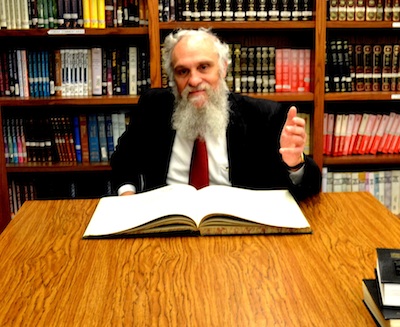By Emily K. Alhadeff, Associate Editor, JTNews
What is the role of the American Orthodox rabbi today? It’s a question with more than one answer, and it’s a question South Seattle’s Orthodox synagogues have been struggling with for years.
Rabbi Moshe Kletenik joined Bikur Cholim Machzikay Hadath in 1994 with the goal of creating a community of learners.
“There isn’t a single encounter with the synagogue that doesn’t involve learning,” he told JTNews. “I think there are many, many more people who study Torah on a daily basis.”
For the past 19 years, Kletenik has offered classes and study groups in halachah (Jewish law), Mishna, the weekly Torah portion, and celebrated a siyum haShas, the completion of the seven-year cycle of daily Talmud study. His wife Rivy complemented his offerings with talks on Tanach, Midrash, Mussar, Pirke Avot, and more.
But as of June 30, Rabbi Kletenik will no longer be the rabbi of the state’s largest Ashkenazi Orthodox synagogue. In a controversial board move last summer, Kletenik’s contract was not extended.
Speaking with JTNews in his office at BCMH, Kletenik reflected positively upon his tenure.
“One of the truly rewarding aspects of being a rabbi is the opportunity to become involved in people’s lives, especially at critical times during their lives,” he said.
Torah study leads to action, and this philosophy is evident given Kletenik’s expertise on business, medical, and interpersonal ethics. In addition to expanding learning initiatives, Kletenik constantly consults on ethical matters, including end-of-life issues, healthcare directives, and wills.
“The teachings of Torah that we find within the Talmud, codes of Jewish law, and responsa literature throughout the centuries are current and can address any issue and any challenge that arises in a meaningful way,” he said. “That is what Jewish ethics is about.
“The more people become aware of it, the more people seek out guidance.”
In addition to advising his congregation, Kletenik initiated and chaired Jewish Medical Ethics Conferences throughout the 1990s, and has lectured locally and nationally on ethical issues concerning organ donations, pregnancy, and end-of-life issues. He served as president of the Rabbinical Council of America from 2009 to 2011, sat on Governor Christine Gregoire’s Faith Advisory Board (2007-2009), and is a member of the Kline Galland Home Health and Hospice Ethics Committee and the Holocaust Emergency Assistance Committee at Jewish Family Service, among other volunteer and board positions.
In 2008, he was granted the King County Coalition Against Domestic Violence Take Action award. Kletenik heads the beit din (religious court) with the Va’ad HaRabanim of Greater Seattle and presides over gittin, Jewish divorce.
Kletenik furthermore oversees three critical institutions run by BCMH for the Jewish community: The mikvah, eruv, and chevra kadisha burial society. Each of these requires halachic authority, which the synagogue will lack come next month.
According to BCMH board president Dan Birk, a matrix of local rabbis will be stepping up to help, and Orthodox Union-appointed rabbis will be available for halachic questions if they arise.
Birk said said the first step, before forming a rabbi search committee, is to figure out what the community wants.
“Our shul is a very diverse group of people,” he told JTNews. “We need a person that can understand the need of the community…In my mind, it’s all about achdus [unity] and getting along under one roof.”
Kletenik will not be involved in BCMH’s future plans, but confirmed he will stay in Seattle. Starting July 1, he will work for the Va’ad, where he plans to expand its services and educational programming and give the beit din more visibility.
Among the services he hopes to expand is business-dispute mediation.
“The Torah has guidance as to how we are to act in every aspect of our lives,” he said. “Whether it is our personal lives, whether it is our professional lives, in terms of our interactions with others, with Jews in the broader community, if one follows the dictates of the Torah — in terms of how we speak to others and about others, how we interact with others — we become better Jews and better human beings, and valuable members of society… But people make their own choices, and rabbis can only teach.”
Walking through BCMH’s beit midrash (study room), where he’s studied and taught for two decades, Kletenik appears momentarily wistful. But he expresses optimism at the future of Orthodox life and reflects positively on the changes he’s seen around him.
“If you look at the national statistics, I think more and more people are recognizing the value of the Torah lifestyle and the richness and beauty and meaningfulness,” he said. “As an Orthodox rabbi, it is certainly my hope that people will choose to be guided by the dictates of the Torah — and so many people are.”
